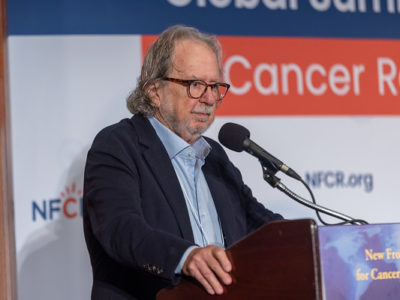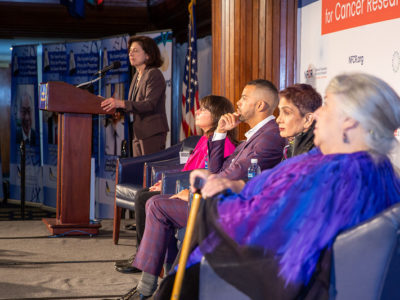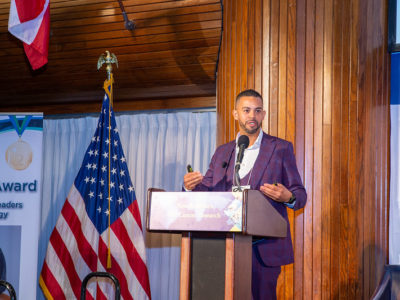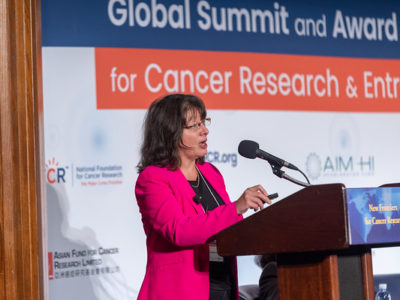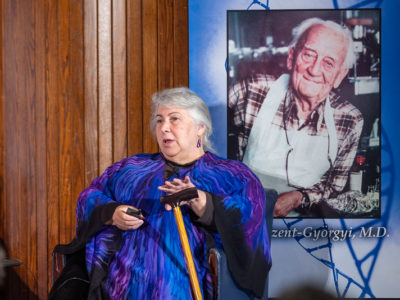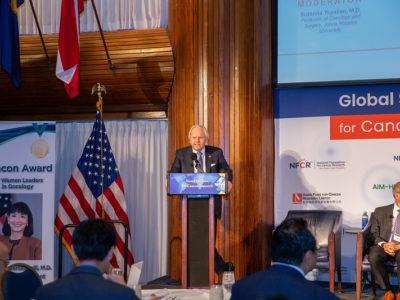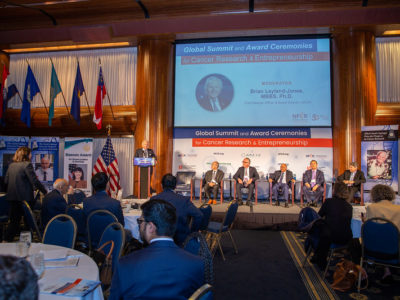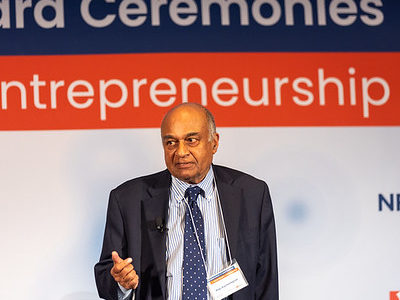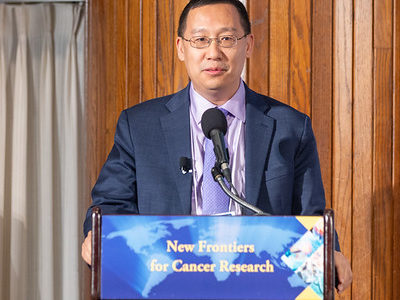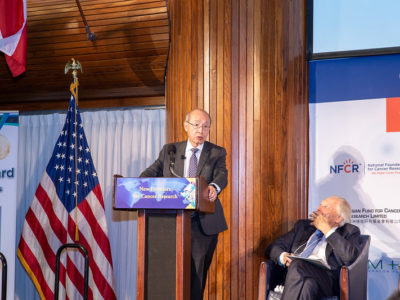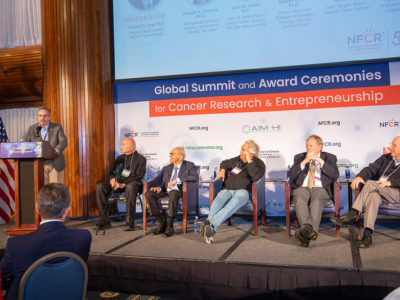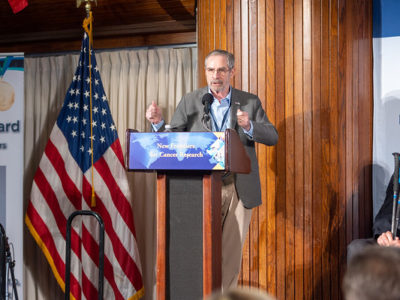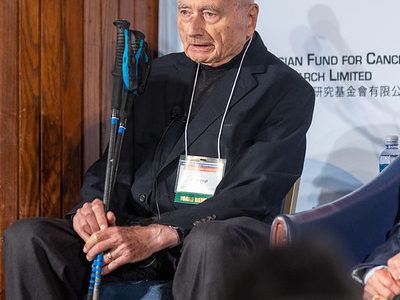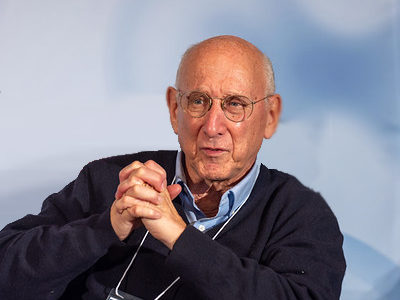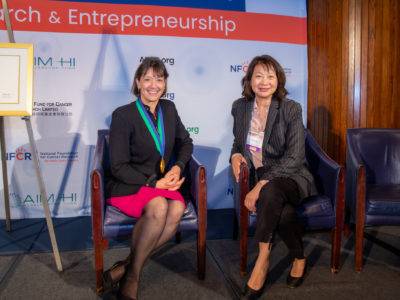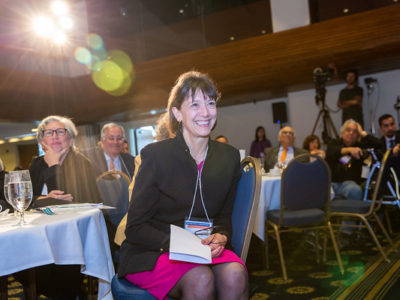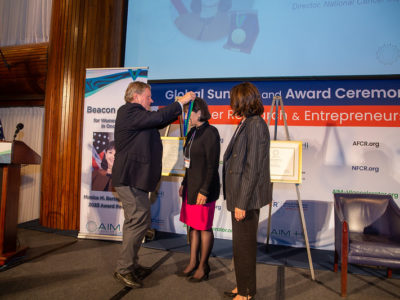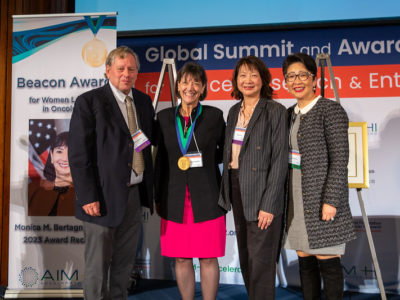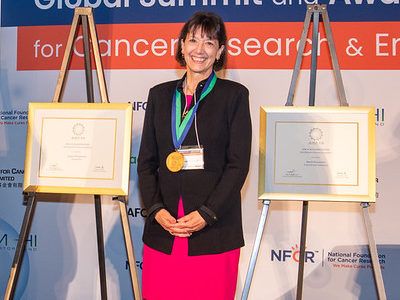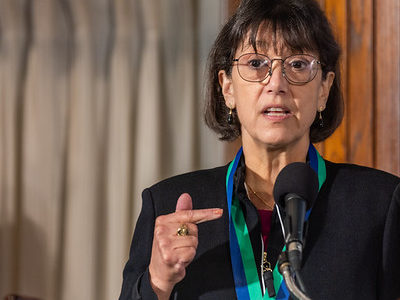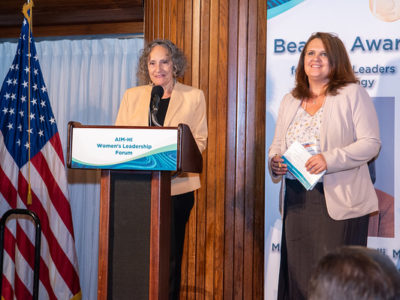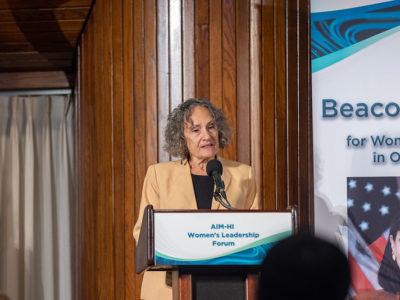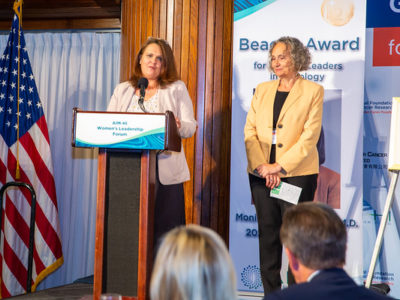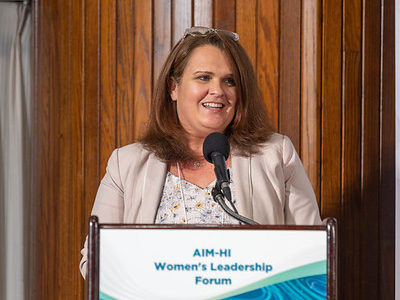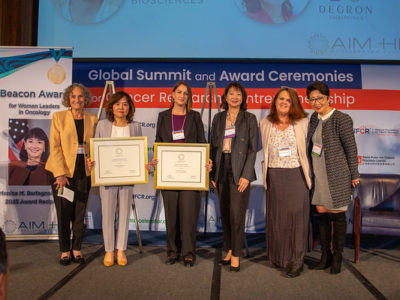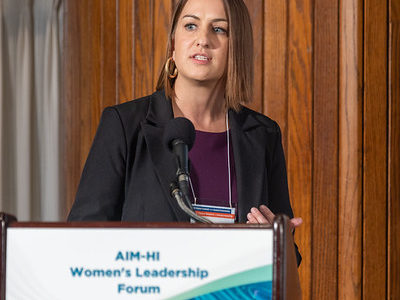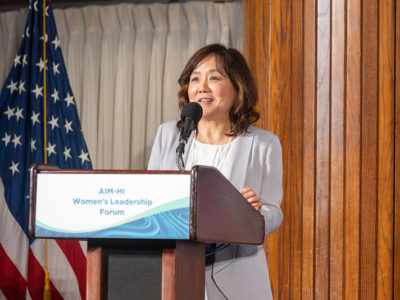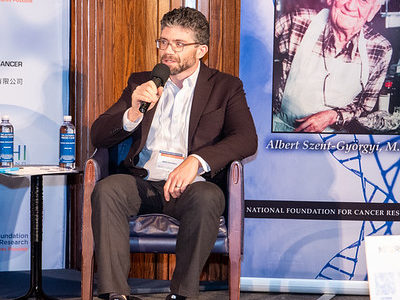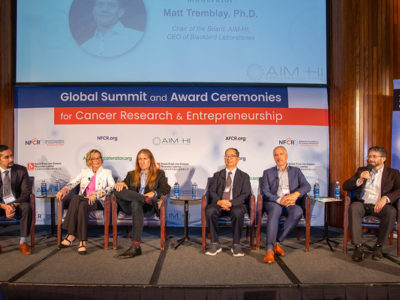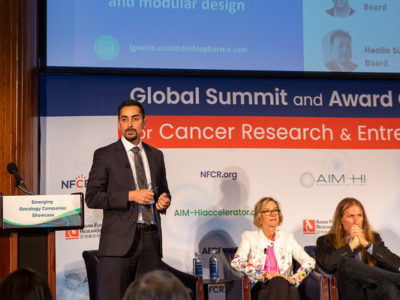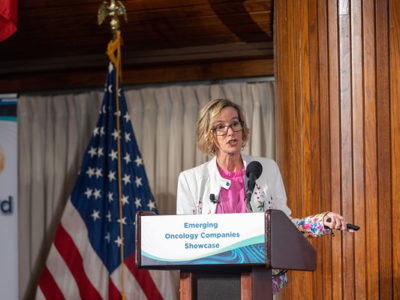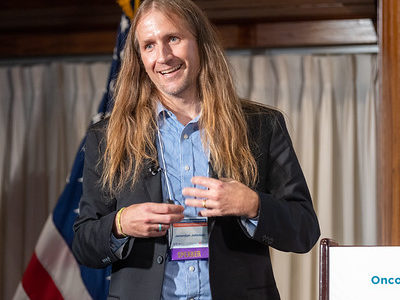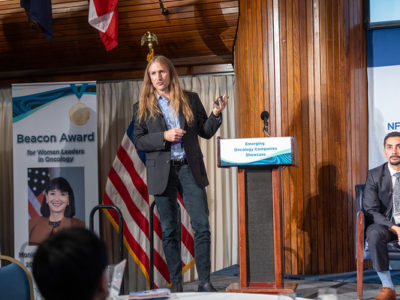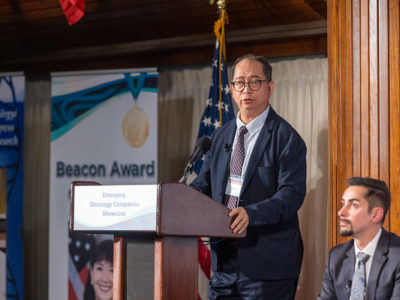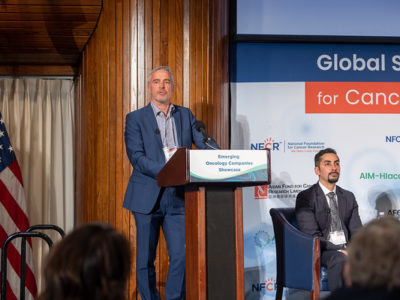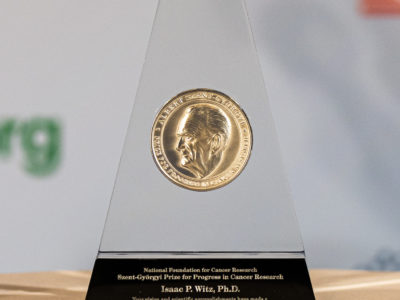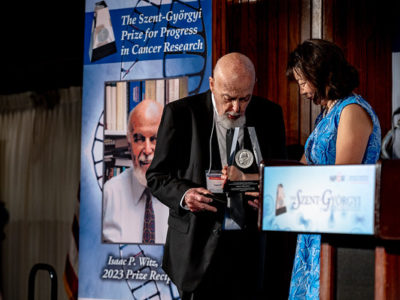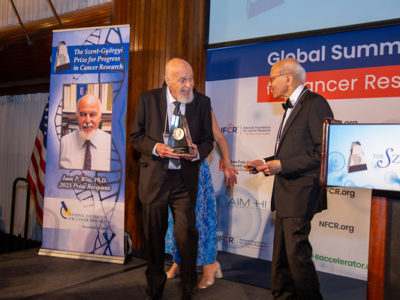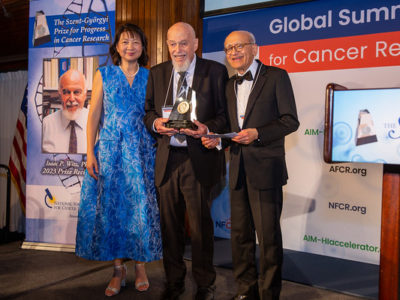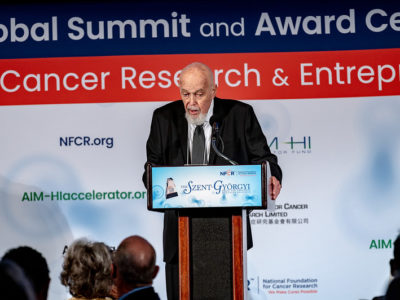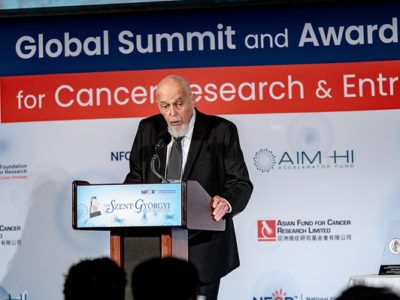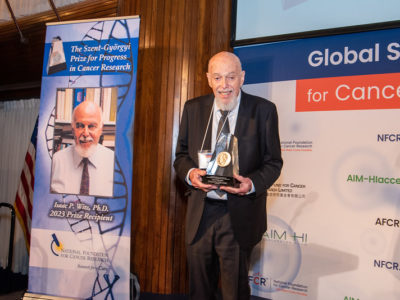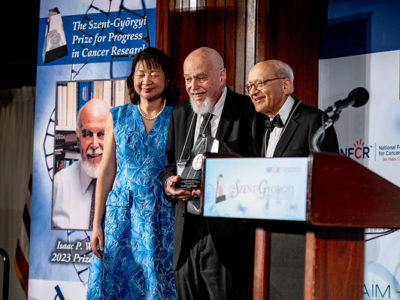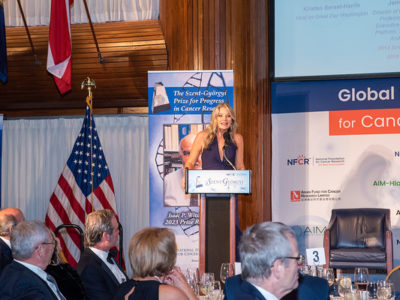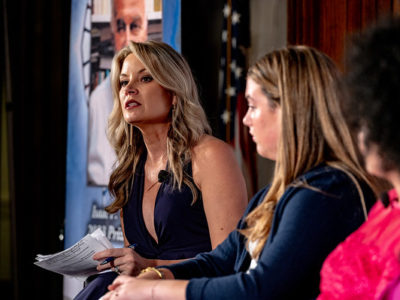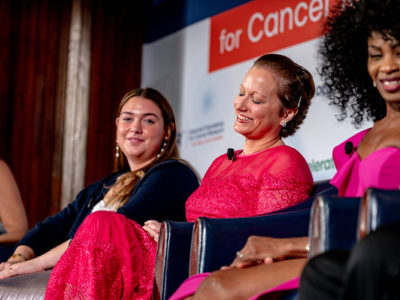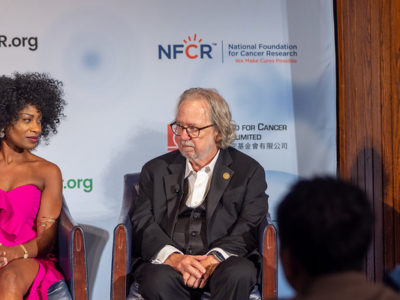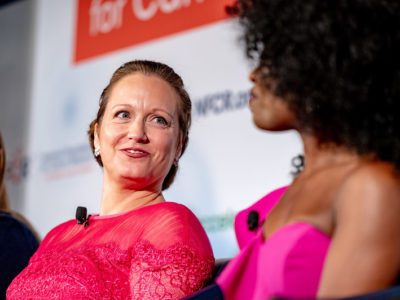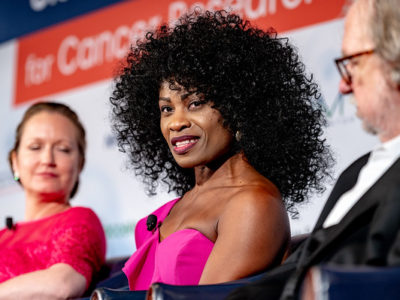The 2023 Global Summit and Award Ceremonies for Cancer Research & Entrepreneurship:
NFCR’s 50 years of pioneering cancer research and supporting scientists in the fight Against Cancer
[Washington, D.C.] The 2023 Global Summit and Award Ceremonies for Cancer Research & Entrepreneurship, held at the prestigious National Press Club and attended in person and virtually by individuals from across the globe, marked a spectacular celebration of NFCR’s extraordinary 50-year journey, beginning in 1973. Initially established as a daring non-profit venture to support discovery-oriented research, NFCR has since transformed into a world-renowned leader in high-risk, high-impact cancer exploration. It has consistently championed innovative programs, inspiring scientists to venture into uncharted territories, and pose ever-bolder questions in their quest for groundbreaking discoveries.
The event united some of the globe’s most prominent leaders in cancer research, oncology care, and entrepreneurship to commemorate five decades of remarkable achievements, all while keeping a vigilant eye on the future and the shared goal of curing cancer.
In this spirit, NFCR extended a warm invitation to Dr. Martyn Smith and Dr. Helmut Sies as keynote speakers to kick-off and reflect NFCR’s early years of impact during the prestigious award ceremony.
As the luminaries of the field of antioxidants and free radicals, Dr. Helmut Sies and Dr. Martyn Smith have made profound contributions to cancer research and public prevention. They reflected fondly about their long-term working journey with NFCR and its leadership teams of two generations. Dr. Sies and Dr. Smith were among the early NFCR-funded scientists of the Oxygen Club at UC Berkeley during NFCR’s nascent years. The foundation’s enduring vision, initially articulated by Dr. Albert Szent-Györgyi, remains as vivid today as ever. The commitment to “Basic Cancer Research First” continues to steer NFCR’s course, ensuring its unwavering dedication to advancing pioneering cancer research and enhancing the lives of patients. Their association with NFCR exemplifies the foundation’s resolute commitment to driving high-impact cancer research and striving for improved patient outcomes and resonates with the organization’s steadfast determination to realize a world where cancer is no longer an unconquerable foe.
NFCR’s history and mission
The day’s proceedings, were opened by Dr. Sujuan Ba, President and CEO of NFCR. She expressed her gratitude for the strong support received from NFCR’s 5.3 Million grassroot donors over the 50 years of NFCR history and acknowledged the collective commitment of researchers, entrepreneurs, donors, and supporters. Dr. Ba highlighted NFCR’s dedication to advancing cancer research, improving survival rates, fostering research collaboration, and daring to explore an understanding of cancer as a disease that can be cured.
NFCR’s unwavering commitment to high-impact research across the whole spectrum of cancer research and care sets it apart from other non-profit organizations. NFCR’s willingness to take risks in supporting scientific endeavors that may not yield immediate results emphasizes its dedication to pushing boundaries and blue-sky research to benefit patients ultimately.
NFCR has been serving as a catalyst for transformative ideas and programs, making a substantial impact on cancer research. In recognition of the global nature of cancer research, NFCR has expanded its reach, fostering collaboration with researchers worldwide. This inclusivity has been instrumental in attracting diverse talent and accelerating advancements in cancer research. The 2023 Global Summit is a true testament to the global community that NFCR has built over the past 5 decades.
The Roots of NFCR: A Meeting of Two Visionaries
The story of NFCR begins with a visionary scientist, Dr. Albert Szent-Györgyi. He was a man of uncompromising curiosity and a staunch believer in the power of fundamental basic research. His reluctance to conform to the bureaucratic rigmarole of grant applications led him to articulate the need for a novel approach of research funding. In a speech at the National Academy of Sciences in 1971, he voiced his apprehension about the traditional funding methods, sparking curiosity among journalists and fellow scientists.
It was a fortuitous moment when Franklin Salisbury Sr. who was a successful entrepreneur and retired attorney, came across a newspaper clipping about Dr. Szent-Györgyi’s concerns. Touched by the scientist’s plea, Mr. and Mrs. Salisbury took action and sent a $25 check to Dr. Szent-Györgyi. Little did they know that this seemingly modest contribution would set the beginning of NFCR in motion.
The Birth of NFCR
In 1973, the National Foundation for Cancer Research was officially established by Franklin and Tamara, together with Dr. Albert Szent-Györgyi. Its mission was crystal clear: to prioritize and fund basic scientific research. Their message, “Basic Cancer Research First,” echoed the vision of Dr. Albert Szent-Györgyi, which has persisted in through the last five decades. NFCR embarked on an extraordinary journey, establishing a “Laboratory Without Walls” concept. This approach encouraged collaboration among diverse disciplines and fostered regional NFCR project directors, connecting scientists internationally. NFCR recognized tackling the enigma of cancer required an alliance of brilliant minds and a convergence of science from various disciplines.
NFCR has transformed over the past 25 years. Recognizing the value of translational research, the foundation expanded its mission to not only fund basic science but to bridge the gap between laboratory discoveries and patient impact. It has been instrumental in convening experts from various disciplines, including scientists, entrepreneurs, venture capitalists, and policymakers, all united by the shared goal of eradicating cancer with a heightened goal: turbocharge the translation of the innovations from the labs to the clinical testing and to patients bedsides.
Morning Program Highlights:
The Promise of Combination Immunotherapy in Cancer Treatment
The 2023 NFCR Global Summit was honored to have Dr. James P. Allison, 2014 Albert Szent-Györgyi Prize winner and 2018 Nobel Prize winner in Physiology or Medicine, deliver his keynote remarks. His innovative research has led to life-saving treatments for those with limited options. His talk highlighted the breakthroughs of checkpoint inhibitors in CTLA4 and PD-1 immunotherapies, which took more than 30 years to be recognized by the mainstream scientific world. He emphasized the progress made through combination therapies, which have significantly improved patient outcomes in some advanced-stage cancers. Many targets are still being explored that could overcome immune exhaustion and leverage the body’s immune system to combat cancer cells, further instilling hope for more effective cancer therapeutics for patients. He highlighted the importance of understanding the intricacies of the immune system and the long and challenging path of scientific discovery. He calls for more science to be conducted to understand patient data in order to design better combination trials, saving patients’ resources and time.
Advancing Cancer Prevention and Treatment Through Innovative Research
The panel on new approaches to cancer prevention and treatments covered research supported by NFCR and invited researchers in the field. This panel was moderated by Suzanne Topalian, M.D. and included esteemed scientists Kornelia Polyak, M.D., Ph.D., Avery D. Posey, Ph.D., Azra Raza, M.D., and Thea D. Tlsty, Ph.D. The panel shared their work from immunotherapy to tumor microenvironment. They discussed the advancements in single-cell profiling, proteomics, transcriptomics, and metabolomics in a spatial manner, which has enabled a much better understanding of why and how tumors progress. Finally, they advocated the need to run trials that establish treatments in earlier stages, such as those drugs that would be more effective as neoadjuvant drugs and administered between the diagnosis and surgery stages. They also called for more paradigm-shifting research for cancer prevention, trying to stop the first cell’s formation and cancer spreading which energized vivid discussions with the audience.
Unraveling the Potential of Liquid Biopsy in Precision Medicine
Moderated by Brian Leyland-Jones, MBBS, Ph.D., the panel on precision medicine included Massimo Cristofanilli, M.D., FACP, Raju Kucherlapati Ph.D., Min Li, Ph.D., Alfred Yung, M.D., and Drew Pardoll, M.D., Ph.D. Following their presentation on the advancements made in precision medicine, they discussed how the landmark initiative, The Cancer Genome Atlas (TCGA), has contributed to better patient stratification and shifted from a morphological to a molecular basis. The panel also covered the importance of liquid biopsy components such as CTCs, cfDNA, and sDNA, and how they contribute to early cancer detection and personalized therapies. They acknowledged the field is still nascent thus far and expressed optimism in spatial profiling every gene in the tumor to better predict responsiveness to mono and combination drug treatments. With the tools at hand, the challenge remains to integrate all these data points to become actionable changes to the standard of care and to expand screening of relevant biomarkers for improved stratification of patients.
Advancements in Cancer Biology Research: Reflection and Vision from Albert Szent-Györgi Prize Winners
This panel, moderated by Douglas R. Lowy, M.D., co-winner of 2018 Szent-Györgyi Prize, gathered the prior distinguished winners of the Szent-Györgyi Prize (Webster K. Cavenee, Ph.D., Carlo M. Croce, M.D., Rakesh K. Jain, Ph.D., Steven A. Rosenberg, M.D., Ph.D., Peter K. Vogt, Ph.D.) to discuss the recent advancements in cancer research, emphasizing the significance of non-coding RNA, the tumor microenvironment, micro-RNA, and three-dimensional models to better understand tumor biology. Many of them emphasized that, despite the breakthrough therapies introduced by immunotherapies, there is a continued challenge in the heterogeneity in response rates for patients, underscoring the need to go towards personalized treatments to expand the scalability and usage of immunotherapy for patients. They called for more investment being needed for fundamental science and better understanding of patients unmet needs.
Afternoon Program Highlights:
Beacon Award for Women Leaders in Oncology
The Beacon Award for Women Leaders in Oncology, established in 2022 by the AIM-HI Accelerator Fund, a translational research and impact-impact investment affiliate of the National Foundation for Cancer Research (NFCR), recognizes trailblazing women leaders in the health and life sciences industry who have made a significant impact on advancing and advocating for cancer treatments, detection, diagnosis and public policy changes for patients around the world.
Dr. Bertagnolli is recognized for her bold and fearless leadership and relentless efforts to advocate for patient care. Throughout her career, she has been a committed cancer researcher, a dedicated oncology surgeon, and a passionate spokesperson for patients, especially the underserved communities.
From oncology-related policy to the advancement of new treatments, Dr. Bertagnolli is a change-maker, who is not afraid to take on the giants to represent a simple premise, “What is in the best interest of the patient and what can I do to help save patient lives.” As the founding chair of the minimal Common Oncology Data Elements (mCODE) executive committee, Dr. Bertagnolli has championed collaborative initiatives to transform data infrastructure for clinical research. She has brought together partners and resources from different sectors to launch groundbreaking efforts in cancer prevention and early detection, a national navigation program for childhood cancers, and additional programs to bring clinical trials to more Americans. Her ability to foster partnerships and facilitate knowledge exchange has propelled progress in the field and united experts in a collective effort to treat cancer. Over unprecedented obstacles, she was appointed as the first woman director of NCI in its 87 years’ history.
In receiving the Beacon Award for Women Leaders in Oncology, NCI director Monica Bertagnolli, M.D. recognized AIM-HI and NFCR for supporting women’s entrepreneurship in oncology. Dr. Bertagnolli spoke about Project Moonshot and solving the problem of cancer, reiterating the Call for Action she put forward from NCI to reduce cancer’s death rate by 50% by 2047 and make the disease treatable and livable for all those who face it. She outlined three priorities in the common goal to cure cancer. 1) Eliminate inequities and allow for equitable access to screening, diagnosis, and treatments to underrepresented populations. 2) Re-build trust in science and have researchers, scientists, and clinicians engage their communities as ambassadors. 3) Optimize the workforce with diverse, talented teams offering innovative solutions. She emphasized the need to support women scientists with resources and relationships to help match the opportunities with talent. She recognized AIM-HI and NFCR’s efforts in serving this need. Dr. Bertagnolli truly embodies the spirit of what the Beacon Award for Women Leaders in Oncology is all about.
AIM-HI Women’s Venture Competition Award Ceremony
The AIM-HI Accelerator Fund, together with the National Foundation for Cancer Research, has a focused goal to address the unmet need described as the “valley of death” in early-stage oncology companies. AIM-HI reviewed more than 300 emerging oncology companies and provided seed investments to selected companies, serving as a catalyst for their further growth and recognition.
As the continuation of one of the initiatives to help women in leadership and entrepreneurship launched in 2020, AIM-HI once again organized the Women’s Venture Competition in 2023, awarding the first prize to Sarah Hein, Ph.D. (March Biosciences) and runner-up to Lily Zou, Ph.D., MBA (Degron Therapeutics) at the Global Summit and Award Ceremonies.
March Biosciences has developed a CD5 CAR T-cell therapy for T-cell lymphoma (TCL) and T-cell acute lymphoblastic leukemia (T-ALL). By genetically modifying T-cells using lentiviral transduction to express chimeric antigen receptor (CAR) targeting the CD-5 antigen, these cells will then be infused back into the patient to target cancer cells in the blood. March Biosciences’ lead asset MB-105 is currently in Phase I trials and has demonstrated to be safe, with promising efficacy data. The Phase II study is expected to begin in the first half of 2024, offering hope for those patients suffering from these deadly hematological cancers.
Degron Therapeutics, and its Co-founder & CEO Lily Zou, Ph.D., MBA. Degron Therapeutics has designed and synthesized a unique molecular glue degrader (MGD) compound library, known as the GlueXplorer platform. It uses its platform in combination with phenotypic screening, proteomic screening, and AI to accelerate the development of novel drugs for previously undruggable targets in oncology which gives more hope to develop promising new therapies.
Emerging Oncology Companies Showcase
Throughout the afternoon, several early-stage companies that AIM-HI and NFCR have supported and recognized (DotBio, Concarlo Therapeutics, Window Therapeutics, Arbele Bio, ManaTBio) shared their missions to make cures possible and save patients’ lives. This panel was moderated by Matt Tremblay, Chair of the Board, AIM-HI and CEO of Blackbird Laboratories. These innovative companies shared their challenges and desired areas for partnering to find new solutions for cancer patients. Dr. Sujuan Ba invited aspiring entrepreneurs with innovative ideas and young oncology companies to connect with AIM-HI for support and guidance. She acknowledged the dedicated individuals and advisers who have been instrumental in bridging the gap between cancer research and patient care, and emphasized that together, we can make a difference for cancer patients.
Evening Program Highlights:
Celebrating Excellence: The Szent-Györgyi Prize for Progress in Cancer Research
The Albert Szent-Györgyi Prize, a hallmark of NFCR, is awarded to individuals whose seminal discovery or pioneering body of work has contributed to cancer prevention, diagnosis, or treatment and has had a lasting impact on understanding cancer, holding the promise of improving or saving lives of cancer patients.
For 2023, Professor Isaac Witz of Tel Aviv University has been selected as the recipient of the Albert Szent-Györgyi Prize. His pioneering work, as early as in the 1960s, paved the way for a deeper comprehension of the immune response within the tumor microenvironment, ultimately impacting tumor biology and growth. Professor Isaac Witz’s contributions have led to paradigm-shifting revelations in the world of cancer research. His pioneering work in tumor microenvironment research challenged established beliefs and reshaped our understanding of the intricate relationship between cancer cells and their surroundings.
Reflecting on Professor Witz’s journey, we recognize the importance of exploring the tumor microenvironment’s multifaceted role in cancer that is leading to new avenues for therapeutic development. The Szent-Györgyi Prize Award Ceremony stands as a reminder of the relentless pursuit of knowledge in the quest to defeat cancer.
The Albert Szent-Györgyi Prize Award Ceremony is a testament to the power of visionary thinkers and collaborative research. As we celebrate these pioneers, we must recognize the enduring importance of basic science, collaboration, and a diverse network of experts in the fight against cancer. NFCR stands as a symbol of hope and progress in this journey towards a world without cancer.
Live Broadcast Panel Discussion:
Stories of Resilience and Hope from Cancer Survivors, Research Advocates, Scientists: Moderated by Kristen Berset-Harris, Host of WUSA-TV.
Cancer, a disease that has touched the lives of countless individuals, is not merely a diagnosis but a battle that brings together people from all walks of life. The panelists’ stories revealed the strength and resilience of cancer patients, survivors, caregivers, researchers, and advocates, and the collective efforts to find a cure for this relentless adversary.
Katie Gray’s journey into the world of cancer research started with a personal loss: her grandmother’s battle with stage four pancreatic cancer. As a high school student, she witnessed her family’s challenges during this time and felt compelled to make a difference. She has organized a campaign to raise funds by utilizing social media platforms to promote baked goods sales during the peak of COVID-19 and recruited other students to serve as advocates to promote the importance of funding cancer research and finding cures for cancer. Katy raised over $18,000 and counting. Katie’s story highlights the importance of breaking the silence around cancer and taking action as early as possible to advocate for what you care about.
Hope Stewart, a cancer survivor, encountered breast cancer in 2002. Her personal experience with the disease led her to become a Community Outreach Ambassador for the National Foundation for Cancer Research (NFCR). Her story emphasizes the significance of supporting and empowering survivors and patients through the difficulties of their journey. She calls for the recognition of all the nurses caring for cancer patients on the front lines and attributes her well-being during the treatment to those who were caring for her every day during treatment.
Linda Bessacque’s story is one of transformation from grief to advocacy. After losing her father to colon cancer and realizing the global disparities in cancer care, she became a Community Outreach Ambassador for NFCR. Her narrative highlights the interconnectedness of cancer issues and the urgent need for international collaboration to provide unmet needs for underserved communities and populations worldwide.
Dr. James Allison shared his own personal experience with cancer, starting at an early age. When he was 10 years old, he lost his mother, Constance, to lymphoma, which planted the seed of a desire to research cancer. Later, he lost several uncles and his oldest brother to prostate cancer. Not long after his brother’s passing, he too was diagnosed with prostate cancer and later with melanoma. He recounted his passion for the field of immunology back in the 1970s, when T cells were just beginning to be identified as defenders of the body. Much later, in the 1990s, he discovered that the molecule CTLA-4 could inhibit T cell activity and developed a monoclonal antibody to block CTLA-4 in mouse tumor models. It was this discovery that eventually led to the therapeutics known as “immune checkpoint therapy.” The monumental achievements of Dr. James Allison in the field of cancer immunotherapy have changed the lives of countless patients. Dr. Allison explained that his personal experiences fueled his commitment to making a difference, emphasizing that every patient is more than just a statistic. He told the audience to find your passion and what you love to do, never give up, and never give in, no matter what other people tell you.
Personal stories like those of Katie, Hope, Linda, and Dr. Allison provide a human dimension to the world of cancer research. They illustrate that behind every scientific paper, every clinical trial, and every breakthrough, there are real lives affected. These stories remind us that the work of researchers directly influences patient lives and gives hope to individuals and families facing the challenges of cancer.
The 2023 Global Summit for Cancer Research and Entrepreneurship brought together leaders in the oncology ecosystem—from academia, clinical care, industry, finance, science, and public policy—to share valuable insights and innovations in the fight against cancer. These summaries of the talks offer a glimpse into the depth and diversity of discussions at the summit, showcasing the collective determination to advance cancer research and improve patient outcomes. Many collaborative discussions emerged immediately following the conference, and we look forward to the outcome of these exciting discussions.
Cures won’t just happen. We need your support. Together we can create a world where cancer is a disease that has been cured. Make cures possible today through a gift to NFCR or Aim-Hi Accelerator Fund.



